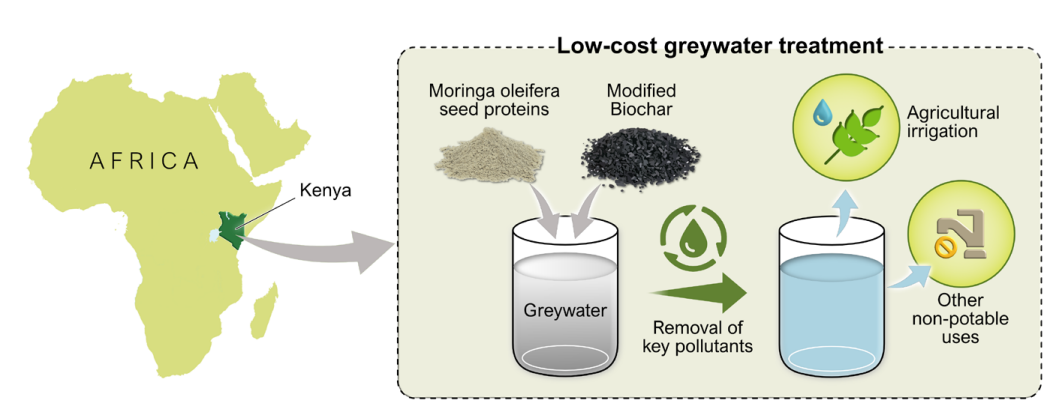
Research highlights
- Locally sourced innovation: First-time integration of biochar from smallholder gasifier cookstoves and Moringa oleifera seed proteins for low-cost greywater treatment.
- Proven performance: Up to 90% turbidity, 85% phosphate, and 75% nitrate removal, plus significant heavy metal reduction in field trials.
- From lab to field: Protocols optimised in Sweden successfully adapted for rural Kenyan households.
- Circular bioeconomy benefits: Uses renewable resources, recycles nutrients, and stores carbon in biochar.
- Community-driven adaptation: Farmer training and co-learning ensured practicality, local ownership, and safe reuse guidelines
Resources
References
Ndinda, C., Njenga, M., Kozyatnyk, I. 2024. Exploring biochar and Moringa oleifera seed proteins for greywater remediation on small farms. Bioresour. Technol., 405, 130935. https://doi.org/10.1016/j.biortech.2024.130935
Rebryk, A., Kozyatnyk, I., Njenga, M. 2024. Emission of volatile organic compounds during open fire cooking with wood biomass: traditional three–stone open fire vs. gasifier cooking stove in rural Kenya. Sci. Tot. Env., 934, 173183. https://doi.org/10.1016/j.scitotenv.2024.173183
Kozyatnyk, I., Njenga M. 2023. Use of biochar and Moringa oleifera in greywater treatment to remove heavy metals and contaminants of emerging concern. Bioresour. Technol. Rep., 24, 101615. https://doi.org/10.1016/j.biteb.2023.101615
Conferences
The work was presented at four conferences:
Sundberg C, Tibbetts H, Zakrisson L, Njenga M, Ndinda C, Kozyatnyk I, 2025. Assessing a complex biochar system with circular economy principles . 3rd International Negative Emissions Conference Proceedings, Edited by N Lutz and S Smith Oxford, 18-21 June 2024. https://doi.org/10.5287/ora-o1yjzd6vx
Kozyatnyk, I., Njenga, M., Nature’s solution to greywater treatment: combining biochar and Moringa oleifera seeds for cleaner water. IWA Water and Development Congress & Exhibition, 12-15 June 2023, 10-14 December 2023, Kigali, Rwanda. Chairing a session on Wastewater strategies and treatment technologies
Kozyatnyk, I., Njenga, M., Greywater treatment using biochar and Moringa oleifera seed proteins. The Biochar Summit, 12-15 June 2023, Helsingborg, Sweden.
Kozyatnyk, I., Njenga, M., Development of a protocol for household greywater treatment using biochar and Moringa oleifera seeds proteins. The 18th IWA Leading Edge Conference on Water and Wastewater Technologies, 29 May-2 June 2023, Daegu, South Korea.
Kozyatnyk, I., Njenga, M., Greywater treatment using biochar and Moringa oleifera seed proteins. 4th International Conference for Bioresource Technology for Bioenergy, Bioproducts & Environmental Sustainability, 14-17 May 2023, Lake Garda, Italy.
Project Participants
This project was implemented through a collaboration between Swedish and Kenyan research and development institutions:
Region Östergötland, Occupational and Environmental Medicine, Linköping, Sweden
Swedish University of Agricultural Sciences (SLU), Departments of Energy and Technology, Soil and Environment, and Ecology and Management, Uppsala, Sweden
Center for International Forestry Research and World Agroforestry (CIFOR–ICRAF), Nairobi, Kenya
University of Nairobi, Wangari Maathai Institute for Peace and Environmental Studies, and the Department of Land Resource Management and Agricultural Technology (LARMAT)
Recordings
Watch a demonstration.
Want to read more?
Funding
Moringa Biochar is funded by the Swedish Research Council for Environment, Agricultural Sciences and Spatial Planning.
Abstract
This project developed and tested a low-cost, nature-based greywater treatment system for rural households in Kenya by combining biochar, produced locally in gasifier cookstoves, with proteins extracted from Moringa oleifera seeds. Laboratory protocols optimised in Sweden were adapted to local conditions and tested in ten households across Kwale and Siaya counties. The approach targeted removal of organic pollutants, nutrients, and heavy metals from greywater generated by laundry activities, enabling safe reuse for irrigation and reducing pressure on freshwater resources. The work aligns with circular bioeconomy principles, promotes community participation, and offers potential co-benefits such as carbon storage and nutrient recycling.
Methodology
Laboratory optimisation: Developed a treatment protocol combining Moringa oleifera seed protein extract and biochar, assessing removal of pharmaceuticals, surfactants, nutrients, and heavy metals.
Field trials in Kenya: Ten households, all experienced in biochar production, tested two treatment methods:
Batch stirring: sequential mixing, flocculation, settling, and cloth filtration.
Layered filtration: Moringa pre-treatment followed by filtration through sand, biochar, and cotton layers.
Data collection: On-site measurements (colour, turbidity, pH, TDS, nutrients, iron) and laboratory analysis at the University of Nairobi.
Sustainability assessment: Life cycle thinking approach to evaluate environmental benefits, resource efficiency, and safe disposal options for spent material.
Community engagement: Hands-on farmer training, co-learning, and adaptation of equipment for local use.
Key Findings
Achieved up to 90% turbidity, 85% phosphate, and 75% nitrate removal, with notable heavy metal reductions.
Local detergent type and water characteristics influenced treatment efficiency.
Biochar–Moringa systems aligned well with circular bioeconomy principles, offering resource efficiency, waste minimisation, and carbon storage potential.
Farmers developed improvised filter units, increasing local ownership and adoption potential.
Safe disposal or reuse of spent filter material identified as a key sustainability challenge.
Impact and Next Steps
Impact: Improved greywater quality for safe irrigation, reduced freshwater demand, and alleviated women’s and children’s water collection burdens.
Scalability: Potential for wider rural adoption through training, subsidies, and private-sector involvement in local filter production.
Environmental benefits: Prevents contaminant discharge to ecosystems, stores carbon in biochar, and promotes nutrient recycling.
Next steps: Optimise treatment for specific contaminants, standardise dosing methods, pilot large-scale deployment, and establish guidelines for safe reuse and disposal of spent filter materials.